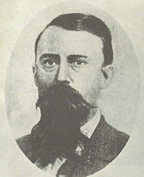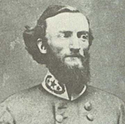Trans-Mississippi Confederate Cavalry
Historical Information

Joseph O. Shelby
"They were not long on flash drills and parades; they were mostly cowboys and farmers who could rope and fire a
revolver at the gallop and who knew very little about military tactics and cared less about military discipline.
They were hard-boiled troops who had to do a great deal with very little. For supplies and equipment they relied heavily
upon capture from the Yankees, or seizure from peaceful citizens. But they were brave and patriotic men-part of that
great army which became a legend for valor and endurance that won battles against heavy odds…Accustomed to a long and
intimate companionship with the horse, with the six-shooter and musket, the men of the Trans-Mississippi…were excellent
potential cavalrymen…in the Trans-Mississippi, Federal horsemen never stood up to the Southerners."
-Stephen B. Oates, Confederate Cavalry West Of The River
Stephen B. Oates remarks summarizes both the virtues and the plight of the Confederate cavalrymen west of the Mississippi River-in particular, the Missourians. Forced to fend for themselves from beginning of hostilities, the Missouri Confederate cavalry were chronically short of almost everything except audacity, high spirits, and excellent horsemanship. Their clothing and equipment were often a motley collection of civilian, Federal (General Shelby once remarked that the Union Army was his commissariat), and the occasional Confederate issue. Discarding the saber (if they were ever issued one) as a useless appendage, they favored Colt revolvers, the ubiquitous shotgun, a good rifled musket, and the much-prized captured Federal carbines.

John S. Marmaduke
Hard-riding Missouri Confederates such as Shelby, Marmaduke, Hays, Shanks, "Swamp Fox" Thompson, Coffee, Porter, and others led these troopers on numerous raids throughout Arkansas, Missouri, and eastern Kansas-often covering distances unheard of east of the Mississippi River. In the most successful of four strategic raids, Shelby's 1863 rampage into Missouri covered 1500 miles and lasted 41 days.
Missouri's Southern cavalrymen participated (often fighting both mounted and dismounted) in every major battle conducted in the upper Trans-Mississippi from Carthage to Pea Ridge to Prairie Grove to Newtonia. In all, Missouri mustered in eleven cavalry regiments for the Confederate cause totaling almost 16,000 troopers. Even in defeat, hundreds of them refused to surrender in May 1865 and chose to follow Shelby, Price, and Kirby-Smith into a self-imposed exile in Mexico-returning to the United States only after Emperor Maximilian refused their offer of assistance. A Federal soldier at Pea Ridge said it best-"they fought the day like devils incarnate, and as if resolved in victory or death."